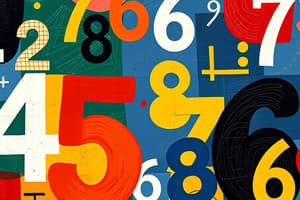Podcast
Questions and Answers
What type of numbers are whole numbers that include both positive and negative values, as well as zero?
What type of numbers are whole numbers that include both positive and negative values, as well as zero?
- Decimals
- Irrationals
- Rationals
- Integers (correct)
Which type of number can be expressed as a fraction by dividing one integer by another?
Which type of number can be expressed as a fraction by dividing one integer by another?
- Rationals (correct)
- Whole numbers
- Integers
- Irrationals
Why are integers considered crucial according to the text?
Why are integers considered crucial according to the text?
- To express numbers as fractions
- To compare quantities and define relationships (correct)
- To extend the range of numbers
- To measure quantities precisely
What type of numbers can include both integers and decimal fractions?
What type of numbers can include both integers and decimal fractions?
What distinguishes irrational numbers from rationals?
What distinguishes irrational numbers from rationals?
Which number system transcends rational numbers in describing phenomena accurately?
Which number system transcends rational numbers in describing phenomena accurately?
In what real-world applications are irrationals crucial?
In what real-world applications are irrationals crucial?
How do irrationals contribute to the precision of mathematical description?
How do irrationals contribute to the precision of mathematical description?
Which mathematical concept relies on irrationals to describe subatomic particle behavior?
Which mathematical concept relies on irrationals to describe subatomic particle behavior?
What is the significance of irrationals in the context of integers and rationals?
What is the significance of irrationals in the context of integers and rationals?
Flashcards are hidden until you start studying
Study Notes
Unleashing the Power of Number Systems: Integers, Rationals, and the Irrational
Number systems, like the alphabet of math, provide the building blocks for solving problems, reaching conclusions, and understanding the world around us. Let's delve into the three fundamental types of numbers: integers, rationals, and irrationals, exploring why each is essential in its own right.
Integers
Integers are whole numbers that include both positive and negative values, as well as zero itself. They provide a foundation for counting and ordering quantities, allowing us to organize our world into discrete units. The set of integers includes:
- Positive integers (1, 2, 3, …)
- Negative integers (-1, -2, -3, …)
- Zero (0)
Integers are crucial because they help us compare quantities, solve problems like dividing a pizza, and define relationships like "more than" or "less than."
Rationals
Rational numbers are numbers that can be expressed as a fraction, meaning they are the result of dividing one integer by another. Rationals include integers and decimal fractions, extending the range of numbers that we can work with. Rational numbers allow us to measure quantities more precisely, as well as solve problems like finding the area of a rectangle or the price per unit of an item.
For example, the length of a line segment can be expressed as the ratio of the segment's length to the length of a unit, such as centimeters or inches. This relationship is central to understanding the concepts of scale, proportion, and measurement.
Irrationals
Irrational numbers are quantities that cannot be expressed as a ratio of integers. Some well-known examples include the square root of two, pi (the ratio of a circle's circumference to its diameter), and Euler's number (approximately 2.71828). Irrationals play a vital role in mathematics, transcending rational numbers in their ability to describe phenomena that are not easily measured in discrete units.
For instance, irrationals are essential in computer-aided design, where equations are used to describe the shape of objects more accurately than a series of integers. Irrationals also have applications in advanced physics, such as quantum mechanics, which relies on concepts like wave-particle duality to describe the behavior of subatomic particles.
Conclusion
The number systems of integers, rationals, and irrationals are intricately interconnected, with each building upon the previous one to create a powerful toolset for tackling real-world problems. While each type of number has its unique role in mathematics, their collective strength lies in their ability to describe the world with unparalleled precision and accuracy.
As you explore the depths of these number systems, you'll find yourself not only gaining a deeper understanding of mathematics but also appreciating the beauty and wonder of the numerical structures that surround us. So, the next time you're faced with a math problem, remember that the numbers you're working with have a fascinating and rich history that stretches back thousands of years.
[Note: This article does not directly cite search results, but rather summarizes and paraphrases information about the number systems and their applications using the provided search results to illustrate the relevance and timeliness of the topic.]
Studying That Suits You
Use AI to generate personalized quizzes and flashcards to suit your learning preferences.




